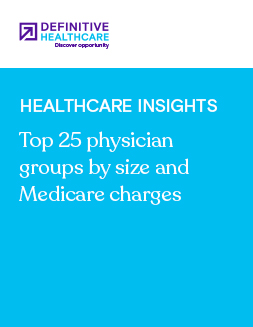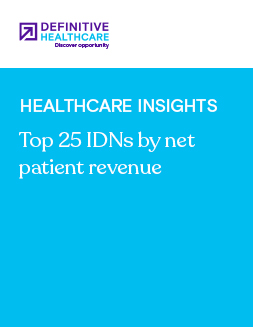Healthcare Insights
How many oncologists are in the U.S.?
From 2003 to 2022, 36.7 million new cancer cases were reported in the U.S., highlighting the scale of the patient population and the corresponding demand on oncology providers. And each year, new cancer diagnoses trend upward, driven by a combination of population growth and an aging demographic.
Understanding the distribution of oncology providers, their practice settings, and the therapies they deliver is critical for everything from clinical trial planning to targeted provider engagement. In this article, we take a closer look at the number and types of oncology specialists tracked by Definitive Healthcare.
What are the different types of oncologists?
Oncology doctors tracked in PhysicianView may have oncology listed as their primary specialty, or they may fall under radiology or surgery specialties as radiation oncologists and surgical oncologists.
Medical oncology specialties
- Gynecological oncology specializes in the female reproductive system including cervical and ovarian cancer
- Hematology/oncology specializes in blood disorders and cancers such as leukemia and lymphoma
- Medical oncology specializes in treating cancer with medication including chemotherapy
- Pediatric hematology/oncology specializes in blood disorders and cancers in children, teens, and young adults
- Radiation oncology specializes in the treatment of cancer using radiation therapy
- Surgical oncology specializes in cancer treatment through surgical procedures
How many oncologists are in the U.S.?
As of October 2025, the PhysicianView product tracks more than 28,000 oncologists in the U.S., based on self-reported specialty, with the following distribution:
| Rank | Primary specialty | Number of physicians tracked | Explore dataset |
|---|---|---|---|
| 1 | Hematology/oncology | 11,937 | Explore |
| 2 | Radiation oncology | 5,998 | Explore |
| 3 | Medical oncology | 4,778 | Explore |
| 4 | Pediatric hematology/oncology | 2,270 | Explore |
| 5 | Surgical oncology | 1,597 | Explore |
| 6 | Gynecological oncology | 1,445 | Explore |
Fig. 1 Data is from the Definitive Healthcare PhysicianView product and represents a provider's self-reported specialty. Accessed October 2025.
What is the most common oncology specialty?
Among oncology-related specialties, hematology/oncology is the most common tracked in our database, with 11,937 physicians, or roughly double the next largest group, radiation oncology (5,998). Medical oncology (4,778) follows closely behind, while pediatric hematology/oncology (2,270), surgical oncology (1,597), and gynecological oncology (1,445) represent smaller, more specialized fields.
Examining the oncologist shortage
The U.S. faces a growing shortage of oncologists, as cancer rates climb and many specialists approach retirement age. At the same time, the demand for cancer care continues to rise faster than the available workforce. Projections point to significant gaps across medical, surgical, and radiation oncology in the coming decade.
The problem is most acute in rural and underserved communities, where few cancer specialists practice and patients often travel long distances to receive treatment.
Without targeted efforts to expand training, improve care delivery models, or leverage technology, access to timely oncology care is expected to become increasingly strained.
Where do oncologists practice?
Oncologists practice across a range of settings, from large health systems to smaller independent clinics. More than half, however, work within health systems such as National Cancer Institute (NCI) Cancer Centers or academic medical centers, where practices tend to be larger and multispecialty.
While a majority work within large systems, the most cancer-related patient visits occur in independent practices, which tend to be smaller and often single-specialty. These practices play a major role in patient care despite operating outside large systems.
Access also varies by geography: rural and low-income areas have fewer cancer specialists, and patients in those regions often travel long distances to reach an NCI Cancer Center.
Learn more
Healthcare Insights are developed with healthcare commercial intelligence from the Definitive Healthcare platform. Want even more insights? Start a free trial now and get access to the latest healthcare commercial intelligence on hospitals, physicians, and other healthcare providers.


